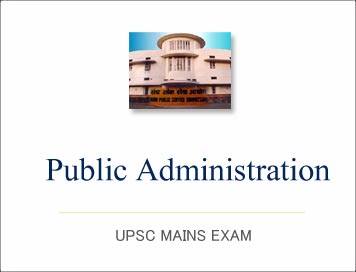Public Administration Mains 2017 : Solved Paper Question Paper-1 (Question-3)
Public Administration Mains 2017 : Solved Paper Question Paper-1 (Question-3)
(Section A)
Q3) a)The Participative Management School of Argyris and Likert advocates democracy within the administrative system. Will this approach be equally useful to developing countries with evolving democracies?(20 marks) (Administrative Behaviour)
ANSWER:Participative management means involvement of workers in
management and decision making process. In a sense, it is sharing of power and
authority between workers and management. It is a measure directed towards
minimisation of class-feelings at the workplace. In the workplace, this concept
is sometimes considered industrial democracy. The most extensive form of
participative management is direct employee ownership .
According to Likert (1961), the lowest level of participation occurs where
employees are given no information about current situation or proposed changes
in a business organisation. McGregor (1971) envisaged the maximum participation
occurring where the manager is indifferent to several alternatives and allows
workers to choose among them.
The Gandhian approach to participative management is known as ‘Theory of
Trusteeship’, where both capital and labour are to function as trustees of each
other and in combination become joint trustees of the property belonging to the
community. It recognises the right of workers to participate in management.
Gandhiji believed in gradual reduction in the power of management and its
transfer to voluntary associations. The other most common approach to
participative management in the non-socialist countries is based on eclecticism.
Participative management is introduced due to one or more reasons and later on
its contents are modified to suit the local conditions. The eclectic approach
emphasises on ‘joint consultation’.
b) “Executive position imply a complex morality and require a high capacity of responsibility” – (Chester Bernand). Comment (15 Marks) (Administrative Thought)
ANSWER:Barnard asserted that responsibility is the property of an
individual by which whatever morality exists in him becomes effective in conduct
and Executive positions (a) imply a complex morality, and (b) require a high
capacity of responsibility, (c) under conditions of activity, necessitating (d)
commensurate general and specific technical abilities as a moral factor. Thus
the endurance of organization depends upon the quality of leadership; and that
quality derives from the breadth of the morality upon which it rests.
Executive responsibility flows from leadership which is the aspect of individual
superiority in determination, persistence, endurance, courage; that which
determines the quality of action; which often is most inferred from what is not
done, from abstention; which commands respect, reverence.
Executive responsibility, then, is that capacity of leaders by which, reflecting
attitudes, ideals, hopes, derived largely from without themselves, they are
compelled to bind the wills of men to the accomplishment of purposes beyond
their immediate ends, beyond their times. Even when these purposes are lowly and
the time is short, the transitory efforts of men become a part of that
organization of living forces that transcends man unaided by man; but when these
purposes are high and the wills of many men of many generations are bound
together they live boundlessly.

